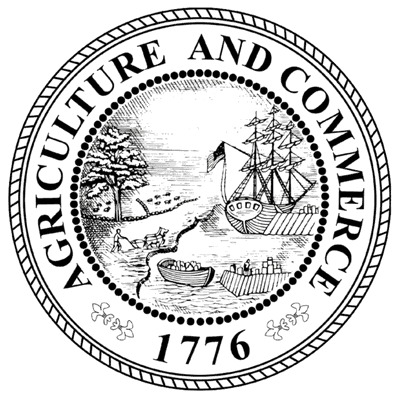

Georgia Symbols
- » 50 States »
- » Histories »
- » State Symbols »
- » Mottos
Georgia State Motto
"Wisdom, Justice, and Moderation"
"Agriculture and Commerce"

Adopted on February 8, 1799; August 17, 1914
Language: English
Focus: Progress and Prosperity and Justice
See Georgia State Seal
Georgia state mottoes were adopted as elements of the State Seal; in this case, The Great Seal of the State of Georgia. The General Assembly of the State of Georgia adopted the state seal on February 8, 1799.

Georgia state seal was changed on August 17, 1914. The date was changed from 1799 (year of the seal's adoption) to 1776 (year of the Declaration of Independence). Except for this change, the Great Seal of the State of Georgia remains today as it was adopted in 1799. These mottos appear on the great seal of the state: one on the obverse, the other on the reverse.
- Obverse: "Wisdom, justice, and moderation"
- Reverse: "Agriculture and commerce"
Georgia State Motto:
"Wisdom, Justice, and Moderation"
"Agriculture and Commerce"
These state have mottos that reference justice:
The Georgia General Assembly has never adopted an
official motto as such. However, in 1799, when the legislature adopted a new state seal, it provided for an arch containing the word "Constitution"
supported by three pillars. The legislation specified that the three pillars represented the three branches of government. Appearing on a banner that
encircling the three pillars were the words "Wisdom," "Justice," and "Moderation"--with each word
associated with one pillar. This later led one historian to conclude that "Wisdom" was to apply to the legislative branch in making the laws, "Justice"
to the judicial branch in their decisions, and "Moderation" to the executive branch to administer laws in moderation. [Lawton B. Evans, A History of
Georgia for Use in Schools (New York: American Book Co., 1898, 1908), p. 152]
"Agriculture and commerce" on the reverse describe the mainstay of Georgia's economic well-being. In 1914, the date of 1799 was changed
to 1776, the date of national independence rather than the date of Georgia's admission to the Union.
Actually, the qualities of wisdom, justice, and moderation with reference to government were first mentioned in chapter 4 of Plato's Republic. In that work, Plato analyzed four cardinal "virtues" associated with government: wisdom, courage, moderation, and justice. It is possible that the soldier with drawn sword standing between two of the pillars was meant as a symbolic representation of Plato's fourth virtuecourage. In any event, the 1799 law creating the state seal specifically provides that the man with drawn sword represents "the aid of the military in defense of the Constitution."
Georgia Law
The law designating the official Georgia state motto is found in the Georgia Code, Title 50, Chapter 3, Section 50.3.30.
This statute describes the Georgia State Seal. The motto is specified within this description.
TITLE 50. STATE GOVERNMENT.
CHAPTER 3.
SECTION 50.3.30.
50-3-30.
(a) The Secretary of State shall keep the great seal of the state adopted August 17, 1914, and on deposit in the office of the Secretary of State.
The seal shall be either of silver or of some harder and more durable metal or composition of metals, 2 1/4 inches in diameter.
(b) The device on one side is a view of the seashore, with a ship bearing the flag of the United States riding at anchor near a wharf, receiving on
board hogsheads of tobacco and bales of cotton, emblematic of the exports of this state; at a small distance a boat, landing from the interior of the
state, with hogsheads, etc., on board, representing the state's internal traffic; in the back part of the same side a man in the act of plowing; and
at a small distance a flock of sheep in different postures, shaded by a flourishing tree. The motto inscribed thereon is 'Agriculture and Commerce,
1776.'
(c) The device on the other side is three pillars supporting an arch, with the word 'Constitution' engraved within the same, emblematic of the Constitution,
supported by the three departments of government, namely the legislative, judicial, and executive. The first pillar has engraved upon a scroll 'Wisdom,'
the second, 'Justice,' the third, 'Moderation'; between the second and third pillars a man stands with a drawn sword,
representing the aid of the military in the defense of the Constitution, and the motto is 'State of Georgia, 1776.






